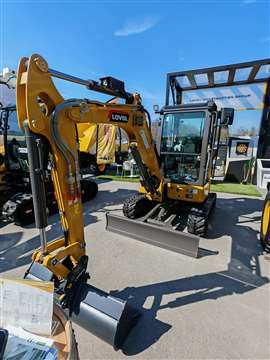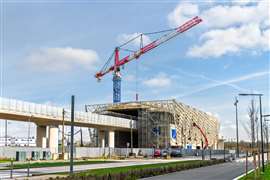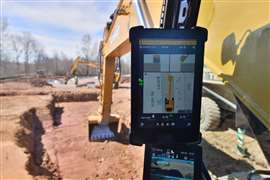Read this article in French German Italian Portuguese Spanish
How one of the Yellow Table’s fastest climbers has ambitious plans for growth
25 July 2025
If you aren’t familiar with the name of Lovol, then the Chinese construction equipment manufacturing is hoping to change that very soon.
Even in a challenging global environment, the company is targeting significant overseas growth in emerging markets and Europe.
 Lovol excavators at its factory in Qingdao, China
Lovol excavators at its factory in Qingdao, China
Backed by its parent company, the state-owned Shandong Heavy Industry Group, Lovol has been investing in new manufacturing capacity, automated production, and electric machinery.
In 2025, the company exhibited at Bauma Munich for the first time, marking a step change in its ambitions. And with annual revenue of $706m, it has already made one of the largest upward moves in this year’s Yellow Table - International Construction’s ranking of the world’s 50 largest construction equipment manufacturers - rising four places to 45th. But that’s just the beginning, according to Mr. Chai Dengyun, deputy general manager at Lovol Heavy Industry.
“In the next five years, our plan is to reach 15 billion RMB (US$2 billion),” he says through an interpreter when Construction Briefing went to visit the company’s ultra-modern excavator manufacturing facility in Qingdao. “We want to enter the top manufacturers, but it is a long road.”
The target is bold, especially in a market environment marked by weak construction activity in China, increased price competition and a cooling global outlook. Lovol’s domestic excavator market share remains modest - around 3.5% - but its presence in the in mining excavators over 70 tonnes is stronger, with 16% market share and a ranking of third in China.
Being selective on overseas markets
The company sees particular potential in emerging markets, especially for mining-related products. “Currently, our main markets [overseas] include Africa, Southeast Asia and South America. These three regions now contribute most to our sales,” says Mr. Chai. “Africa is the biggest market, then Southeast Asia. Then the third is South America.”
Europe, meanwhile, is considered a strategic target – albeit one where Lovol acknowledges it is still learning. “We entered the Europe market very late, from 2023,” says Mr. Chai. “We are ready for this market mainly for machines below 30 tonnes and wheel loaders around below eight tonnes.”
 Mr. Chai Dengyun, deputy general manager, Lovol Heavy Industry
Mr. Chai Dengyun, deputy general manager, Lovol Heavy Industry
By contrast, Lovol has no immediate plans to expand in North America - at least not for now, as tariff uncertainty persists. “To be an international company, North America market is the final goal. We must enter this market,” says Mr. Chai. “But until now we have no plan to enter.”
Instead, the company is working to build brand recognition and strengthen its aftersales and parts support in the overseas regions where it does plan to grow its presence. “Most important is the product quality. And also we need to establish a sales network who will be reliable and also share similar values with us,” says Chai. “We give strong support to our dealers and also our customers. Also, we are hiring some local people to support these networks.”
Asked whether Lovol is considering acquisitions to accelerate growth overseas, Mr. Chai is cautious: “I think it’s not the right time…Maybe our volume is not there. But I think we still hold the plan for the future when the time is right.”
A key pillar of Lovol’s growth strategy is its recently opened, highly automated production facility. “The capacity of this factory is 23,000 units,” says Mr. Chai. “The welding is 90% robot, 100% of the painting is automatic, and 70% of assembly is automatic. This factory was built to reduce the cost, to improve the efficiency.”
Electrification and automation
The focus on cost, quality and consistency aligns with Lovol’s increasing emphasis on electrification and automation - two of its top research and development priorities. “Our first priority is electric,” says Chai. “In the Chinese market, 40% of all new wheel loaders sold are electric. The demand for this electric product, especially in the mining business, is booming now.”
 Lovol’s Stage V-compliant FR36F-u Intelligent Excavator debuted at Bauma 2025 (Image: Neil Gerrard)
Lovol’s Stage V-compliant FR36F-u Intelligent Excavator debuted at Bauma 2025 (Image: Neil Gerrard)
That trend may take longer to play out in Europe, where charging infrastructure remains a limiting factor. But Lovol is positioning itself for a shift in demand. “The trend is there, but the volume is still low. Especially for the compact machines, the market will increase,” says Mr. Chai.
In addition to electrification, Lovol is focusing on intelligent driving technologies - including remote control and unmanned systems - as well as compact and multifunctional equipment. “The demand for the mini and compact machines, especially for municipal is increasing. So that is our next priority,” says Chai.
Lovol has come a long way in recent years, supported by the broader Shandong Heavy Industry Group portfolio, including powertrains from Weichai and hydraulic systems from Linde Hydraulics. The next challenge will be to convert that technical capability into sustained international growth.
“We have a long history, and we have achieved some achievements,” says Mr. Chai. “But because the market is so huge, we always try to focus on the main markets like wheel loaders, excavators, mining trucks, backhoe loaders. Also we are planning to expand to new businesses and want to invest more in the key businesses, especially in mining.”
Whether Lovol can make the leap to global relevance will depend not only on product and pricing, but on the company’s ability to localise, support, and adapt. “Our slogan is we aim for the customer’s maximum satisfaction,” says Mr. Chai. If Lovol can deliver on that promise in its chosen markets, it may climb even higher in next year’s Yellow Table.
STAY CONNECTED



Receive the information you need when you need it through our world-leading magazines, newsletters and daily briefings.
CONNECT WITH THE TEAM










